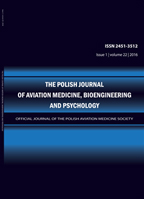2014, Volume 20, Issue 4
Excess Body Weight as a Risk Factor to Well-being and Performance of Flight Personnel: Potential Strategies of Prevention
Agata Gaździńska1, Rafał Wójcik1, Michał Janewicz1, Marek Binder2, Mariusz Wyleżoł1, Stefan Gaździński1
-------------------------------------------------------------------------------------------------
1Military Institute of Aviation Medicine
2Department of Psychology, Jagiellonian University
Autor korenspondencyjny: Stefan Gaździński; Military Institute of Aviation Medicine; email: sgazdzin[at]wiml.waw.pl
Full text
Streszczenie
Flight personnel is at risk of excessive weight and obesity. This is due to, for instance, irregular work schedules, irregular nutritional habits, excessive workload, and an inability to plan regular physical exercise or recreation. These factors lead to excessive body weight gains, and hence to obesity. Obesity directly influences quality of life as well as readiness to perform duties by flight personnel.
Obesity is an independent risk factor for various diseases such as hypertension, type 2 diabetes, coronary artery disease, atherosclerosis, each of which can lead to a loss of medical licence. Obesity is associated with extensive caloric consumption that cannot be controlled by the affected person. State of the art research has demonstrated not only hormonal and neuronal changes associated with obesity, but also points to deterioration of cognitive functions; these changes are likely induced by suboptimal diets. Furthermore, we will review prevention strategies, as well as treatments a med at losing weight in flight personnel already affected by obesity. Implementation of these programs may prolong the time a pilot is fit to fly and improve his/her performance.
Słowa kluczowe
dietary interventions, flight personnel, lifestyle, neuroimaging, obesity
